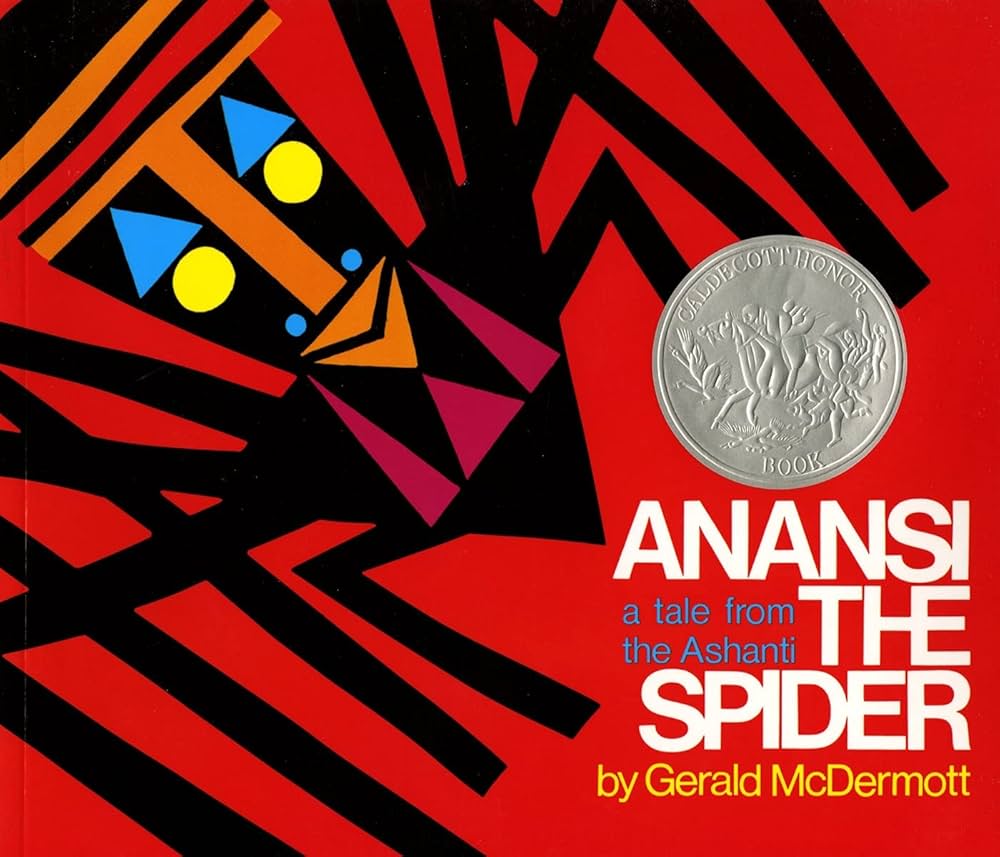Get ready to dive into the fascinating world of Anansi the Spider, a famous trickster from West African folklore. We’ll journey through timeless tales, uncovering Anansi’s cleverness, sharp wit, and the deep wisdom woven into his stories. From the bustling streets of Ghana to the shores of the Caribbean, Anansi’s legacy continues to inspire and enchant. Join us as we explore the intricate web of Anansi’s tales, trickery, and timeless wisdom.
The Legend of Anansi: More Than Just a Spider
Anansi the Spider isn’t your average arachnid. He’s a legend, a smooth talker, and a master of escaping sticky situations—literally! Beloved in African folklore, he’s famous for his quick wit and talent for spinning tales as intricate as his webs.
We’re talking about a spider who bends the rules, outsmarts those bigger than him, and always lands on his eight feet. But Anansi is more than just a trickster; he’s a symbol of resilience, resistance, and the enduring power of stories.
Think of him as a spider with a silver tongue, a kind of ancient African superhero who uses brains over brawn. His origin story takes us back to West Africa, where he’s not simply a spider, but possibly a wise deity cleverly disguised in eight-legged form. He’s like a walking, talking fable, teaching life lessons and sharing cultural wisdom through his captivating adventures.
Anansi’s tales traveled across the ocean during a dark time in history—the transatlantic slave trade. For Africans forced from their homes, Anansi’s stories became a source of comfort, a connection to their roots, and a symbol of hope in the face of adversity.
Anansi’s influence didn’t stop there. He’s found his way into books, movies, and even festivals, reminding us that stories have the power to bridge cultures and connect us across generations. He’s a testament to the idea that even the smallest can overcome obstacles with wit and determination.
So, the next time you see a spider web glistening in the sun, remember Anansi, the extraordinary spider who reminds us that even when facing challenges, a good story and a little bit of cunning can go a long way.
Unraveling the Myth: How Anansi Brought Stories to the World
Anansi isn’t your typical fairytale creature. Picture him as a spider, but not just any spider—this one can talk, think, and even shape-shift into a human! He’s a popular figure in West African stories, a bit of a trickster, yet also incredibly clever and often seen as a link to the divine. Think of him like a mischievous god who loves a good puzzle.
One of his most famous tales explains how stories came to be in the world. A powerful being, perhaps a god or a king depending on who’s telling the story, decided to play a game with Anansi. The challenge? To gather all the stories in the world. Now, this seemed impossible! But Anansi, true to his nature, used his wits and cunning like a master strategist. He tricked dangerous creatures, outsmarted powerful spirits, and in the end, he actually pulled it off! This is why he’s often seen as the keeper of stories, a kind of ancient librarian of tales.
What makes Anansi’s stories so compelling is that they aren’t just fun adventures. They’re packed with lessons about life, such as the importance of being clever and resourceful, but also warnings about greed and arrogance. It’s like your grandparents telling you folktales, teaching you right from wrong without being preachy. This is likely why Anansi is still so popular today. His stories have traveled across the ocean with the slave trade, finding a new home in the Caribbean and continuing to entertain and teach new generations.
The Wisdom in the Web: What Anansi Teaches Us
Anansi, the clever spider from West African tales, isn’t your average bug. He’s a god, a trickster, and a master storyteller. His adventures aren’t just fun to hear; they offer profound lessons. It’s like your grandparents telling you stories with a little extra wisdom sprinkled in.
One significant theme Anansi embodies is the power of intellect. He’s always outsmarting bigger, stronger characters with his quick thinking and clever plans. It’s like that saying, “Brain over brawn.” Anansi proves you don’t always need muscles to succeed; a good strategy can be just as effective.
But Anansi’s stories aren’t just about being clever. They also explore the consequences of our actions. Sometimes Anansi gets a little too tricky and finds himself in trouble! This reminds us that every choice has an outcome, and we need to think before we act. It’s a lesson in responsibility—doing the right thing, even when it’s tough.
Another fascinating aspect of Anansi is his connection to the power of stories. Think about it: we’re still talking about him today! His tales, passed down for generations, have kept traditions alive and taught valuable lessons. He shows us how vital it is to share our stories and maintain our connection to the past.
Anansi isn’t afraid to tackle real-life issues either. His adventures often poke fun at how society works, both the good and the bad. He points out things about power, greed, and how people treat each other. It’s like he’s holding up a mirror to human nature and making us think about our own actions.
Even though Anansi is a tiny spider, he teaches us significant life lessons. He reminds us to be smart, think about our choices, and learn from the stories around us. He demonstrates that wisdom can come from unexpected places, even from a spider spinning tales under the African sun.
Cultural Roots: Tracing Anansi Back to His Origins
We’ve been discussing Anansi, the incredibly cool spider character, but he’s not just any spider. He has deep roots within a specific group of people—the Akan people of Ghana, especially the Ashanti. He’s like their very own superhero, but instead of saving the day with super strength, he uses his intelligence and a bit of trickery!
The stories of Anansi weren’t written down in some ancient book. They’ve been shared and passed down through generations by word of mouth. It’s like a giant game of telephone, but instead of getting things mixed up, the stories have evolved with each telling, reflecting how the world around them changes too.
Anansi himself is quite the character. He’s not just some mischievous prankster, though he does love a good prank! He’s also considered a wise figure with a wealth of knowledge to share. Think of him like that one friend who always seems to know the answer, even if they got it in a slightly sneaky way.
Anansi’s stories, while entertaining, aren’t just for fun. They impart important lessons about the values cherished by the Akan people. We’re talking about quick thinking, resilience (bouncing back from difficult situations), and being adaptable (like changing plans when things don’t go your way). These stories also provide insight into human interactions and the challenges people face.
One of the most intriguing aspects of Anansi is that he’s not just a regular spider; he often exhibits human-like qualities in the stories. It’s almost like he bridges the gap between the animal world and our own human experiences.
Stories have a way of spreading, and Anansi’s tales are no exception. Unfortunately, a significant part of how his stories journeyed across the world is tied to a dark period in history: the transatlantic slave trade. As people were forcibly taken from their homes in Africa, they carried with them their stories, culture, and memories. Anansi’s stories found new life in the Americas, particularly in the Caribbean, where they blended with local traditions and continued to evolve.
So, the next time you encounter a story about a clever spider tricking his way through a tricky situation, remember Anansi. He’s more than just a character in a folktale—he’s a symbol of resilience, adaptation, and the enduring power of storytelling.
A Web of Dilemmas: The Problem Anansi Couldn’t Trick His Way Out Of
Anansi, as we know, is renowned for his cleverness. He’s practically a legend in West African stories, possessing the smarts and tricks to navigate all sorts of situations. But there’s one story that poses a unique challenge, even for someone as sharp as Anansi.
The story goes that Anansi accomplishes a remarkable feat, a true act of heroism. As a reward, he receives a “globe of light.” What this globe actually is remains open to interpretation. Some believe it represents the sun, radiating brightness and power, while others envision it as something more abstract—knowledge, perhaps, or a profoundly valuable concept. Whatever it is, it’s something extraordinary, and Anansi must decide what to do with it.
Here’s where the trouble begins. Anansi has sons, and like any good parent, he wants the best for his children. He thinks, “Who deserves this amazing gift more than my own flesh and blood?” But there’s a catch: how do you choose which son receives something so incredible? It’s like trying to pick your favorite star in the sky!
This is Anansi’s dilemma. He strives to be fair, to make the right choice, but how can he possibly measure his love for each son and declare, “You are more deserving”? It’s a problem that many parents can relate to, even without a magical globe involved!
This story prompts us to consider: What does it truly mean to be fair? Can love and justice genuinely coexist? Anansi’s struggle isn’t just a fable; it’s a reflection of the intricate situations we all encounter in life as we try to reconcile our desires with what we believe is right.
Explore More Ancient Lore
Intrigued by ancient mythology and symbolism? Explore the mysteries of other cultures:
- Uncover the secrets of the Anubis symbol, the ancient Egyptian god of the underworld, representing death and mummification.
- Journey through the Anunnaki compass, and delve into the history of this enigmatic ancient civilization believed to have influenced humanity.
- Decipher the profound meanings of Anunnaki symbols and their connection to cosmic knowledge.
- Unveil the significance of the Aztec nose, a symbol of divine power worn by ancient Aztec warriors and rulers.
- Unlocking Francis Alexander Shields’ Finance Empire: A Comprehensive Biography - July 12, 2025
- Unveiling Francis Alexander Shields: A Business Legacy - July 12, 2025
- Francis Alexander Shields’ Business Career: A Comprehensive Overview - July 12, 2025
















4 thoughts on “Anansi the Spider: Tales, Trickery, and Timeless Wisdom”
Comments are closed.